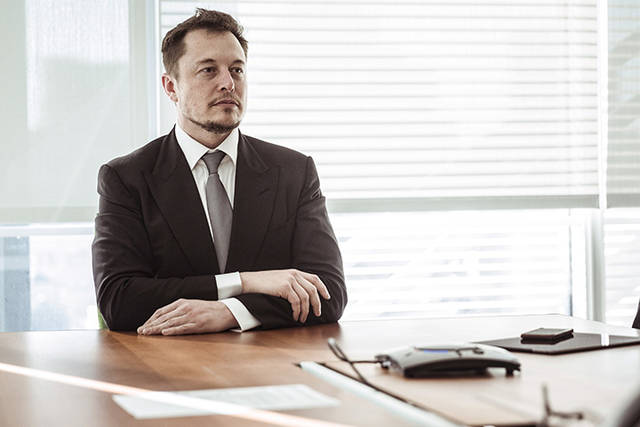SEC seeks to oust Tesla CEO Elon Musk over go-private tweet

NEW YORK TIMES
Elon Musk, the chief executive of Tesla, in New York in 2016. The Securities and Exchange Commission filed a lawsuit today against Musk, accusing him of making false public statements with the potential to hurt investors.
DETROIT >> U.S. securities regulators are asking a federal court to oust Tesla Inc. CEO Elon Musk, alleging in a complaint that he committed securities fraud with false statements about plans to take the company private.
The Securities and Exchange Commission says in the complaint filed today that Musk falsely claimed in an Aug. 7 statement on Twitter that funding was secured to take the company private at $420 per share, a substantial premium over the price at the time.
The complaint filed in the U.S. District Court in Manhattan says that Musk had not discussed or confirmed key deal terms including price with any funding source. It also asks for an order enjoining Musk from making false and misleading statements along with repayment of any gains as well as civil penalties.
“Corporate officers hold positions of trust in our markets and have important responsibilities to shareholders,” Steven Peikin, co-director of the SEC’s Enforcement Division, said in a statement. “An officer’s celebrity status or reputation as a technological innovator does not give license to take those responsibilities lightly.”
An SEC press release says the agency asked the court for a “bar prohibiting Musk from serving as an officer or director of a public company.”
Tesla issued a response from Musk via email.
Don't miss out on what's happening!
Stay in touch with breaking news, as it happens, conveniently in your email inbox. It's FREE!
“This unjustified action by the SEC leaves me deeply saddened and disappointed,” he said in the statement. “I have always taken action in the best interests of truth, transparency and investors. Integrity is the most important value in my life and the facts will show I never compromised this in any way.”
The complaint alleges that Musk’s tweet harmed investors who bought Tesla stock after the tweet but before accurate information about the funding was made public.
Ousting Musk would be difficult and could damage the company because he’s viewed by many shareholders as the leader and brains behind the company’s electric car and solar panel operations.
Joseph Grundfest, a professor at Standford Law School and former SEC commissioner, said Musk will likely want to avoid going to trial in the case and opening the door to “a lot of testimony about his state of mind.”
Grundfest said there are many potential ways the case could be settled, including some scenarios in which Musk stays on as CEO. He said that would likely entail putting some constraints on Musk, such as prohibiting him from making public statements without supervision and public approval.
“One possibility could be to appoint someone as a monitor over all of his communications. He wouldn’t be able to tweet or post anything directly without the approval of a chaperone,” Grundfest said.
He said other possible solutions would be to “constrain his ability to act in certain roles within the company.” He said Musk could agree to step down as CEO and instead take another title, such as chief production officer.
Grundfest said that whether Musk can stay on as CEO is “almost entirely up to Elon” and whether he is able to negotiate a settlement with the SEC.
“He is not going to be able to remain as CEO with no conditions. That is not on the table.”
Grundfest also said that the challenge for the SEC is to “appropriately discipline Musk while not harming Telsa’s shareholders.”
He noted the company itself is not being sued and that any penalty must be paid by Musk.
“If you totally kick Musk out of the company, that probably hurts shareholders more than anyone else,” Grundfest said.
The SEC alleged in the 23-page complaint that Musk made the statements using his mobile phone in the middle of a trading day. That day, Tesla shares closed up 11 percent from the previous day.
“He did not discuss the content of the statements with anyone else prior to publishing them to his over 22 million Twitter followers and anyone else with access to the Internet.”
The statements, the complaint said “were premised on a long series of baseless assumptions and were contrary to facts that Musk knew.”
Shares of Tesla fell 11 percent in after-hours trading to $273.56, after falling 2 percent before the market closed today.
In its complaint, the SEC said that Musk’s go-private statement hurt short sellers, investors who borrow a company’s stock betting that it will fall. Then they buy the shares back at a lower price and return them to the lenders, pocketing the profit.
In August, more than $13 billion worth of Tesla shares were being “shorted” by investors, the complaint said.
Musk also failed to notify the Nasdaq stock exchange, on which Tesla shares are traded, before releasing the go-private tweet. Nasdaq rules require notification of plans to release “material information” at least 10 minutes before the release, according to the complaint. The tweet forced Nasdaq to suspend trading of Tesla shares Aug. 7 for about 90 minutes.




